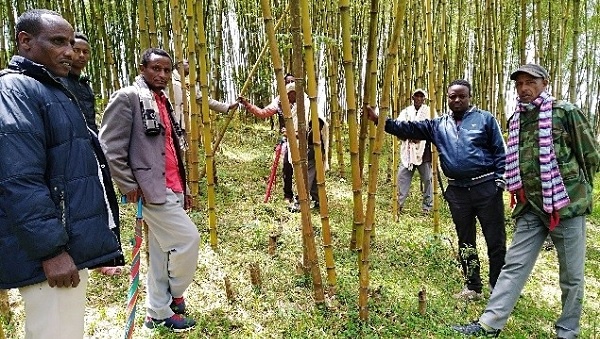
INBAR’s Dutch-Sino-East Africa Bamboo Development Program continues to further INBAR’s goals and support bamboo producers, manufacturers and consumers in the region with two bamboo-based activities in Ethiopia: a training workshop on sustainable management for bamboo farmers, and an exhibition of bamboo products.
The ongoing Dutch-Sino East Africa Bamboo Development Program is based in Uganda, Kenya, and Ethiopia and aims to help these nations capitalize on their as yet largely untapped bamboo sectors. In June 2019, the project organized two activities in Ethiopia aimed at promoting sustainable management of bamboo resources and at raising the profile of bamboo.
Ethiopia has been a Member State of the International Bamboo and Rattan Organisation (INBAR) since 2002, and hosts INBAR’s East Africa Regional Office. Successful bamboo initiatives have taken place in Ethiopia, including using bamboo to restore degraded land and mapping the country’s available bamboo resources. This project builds on the work of these past initiatives and aims to reduce poverty, promote sustainable development; increase international trade and investment; and mitigate climate change.
The project has already been working towards these goals by supporting the development of viable industrial value-chains in Ethiopia’s bamboo sector. Most recently this support took on the form of a two-week long on-farm training on sustainable management and harvesting. The training, which took place from 22 May to 4 June 2019 at the Arbegona Woreda, Sidama Zone, Southern Nations, Nationalities, and Peoples’ Region, Ethiopia, included classroom sessions, practical demonstrations, and the implementation of learnt skills on bamboo farms.
Forests and plantations which are not optimally managed can lead to drops in productivity and in the quality of the bamboo poles. In order to develop enterprises and industries, it is essential to sustainably manage and harvest bamboo to ensure a good quality supply of raw materials for processing. This increased productivity benefits all stakeholders in the value chain including bamboo farmers who manage these resources.
The workshop aimed to promote sustainable management strategies and was attended by over 100 farmers who during the latter half of the workshop were able to put their new skills to the test. Together they brought approximately 50 hectares of on-farm bamboo plantation under a sustainable management and harvesting regime. This was accomplished in part by recording detailed data about the bamboo farm using the INBAR bamboo assessment mobile app.
Read the complete story at INBAR
